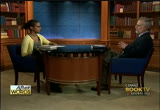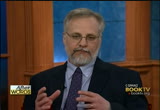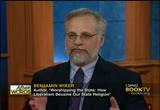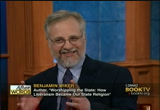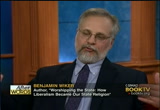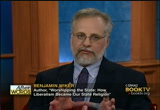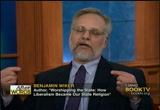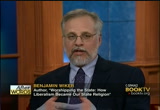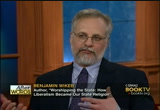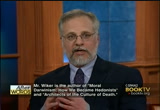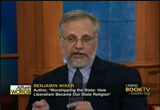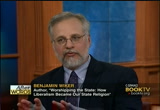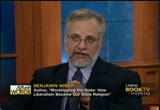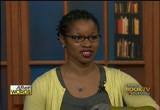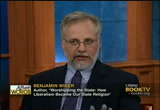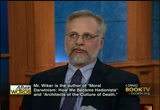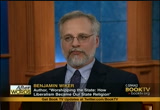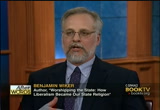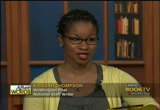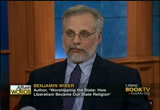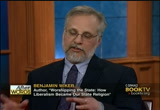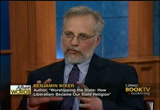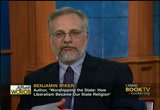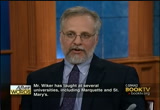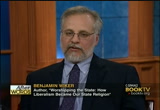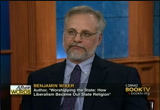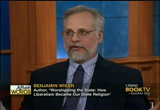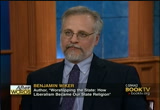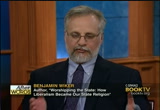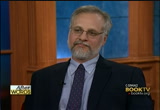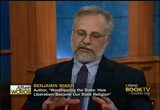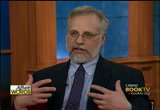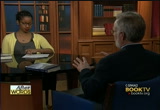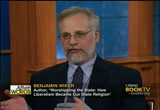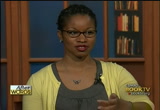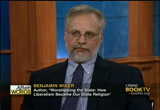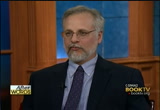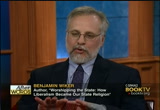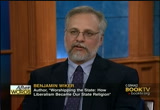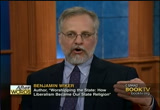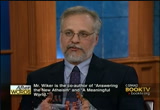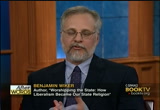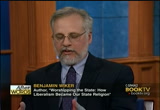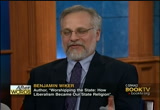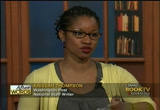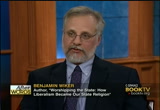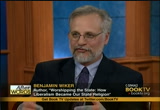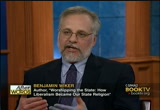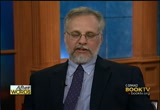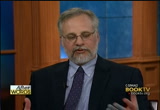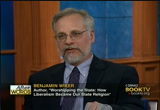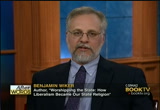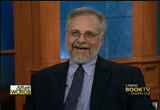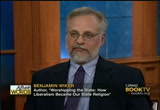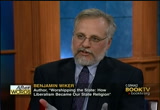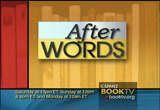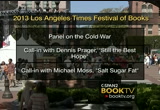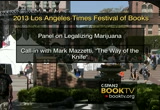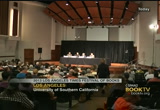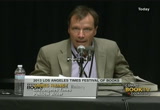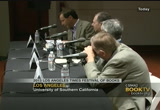tv Book TV After Words CSPAN April 22, 2013 12:00am-1:01am EDT
12:00 am
12:01 am
a rejection of christianity and affirmation of whatever their secular focus was. french revolution, liberty, fraternity, awe quality, nationalism, of course, pick your nation, itly -- italy is a good example, gerny, a fascism, naziism, and socialism. what i call soft socialism, which forms the foundation of liberal democratic states in the west. europe, more so, obviously, and then the united states more and more, and that itself has a religious foundation. what i'm arguing in worshiping the state in the way, in the sense these scholars have been looking on political religions since then 1920s, and i'm assuming it's a political
12:02 am
religion, and what you're seeing is the establishment of a particular well-defined world view. every entity as extensive as clippity, which is it trying to displace, going from met physics, what nature is what reality is, what human nature is, town to morality. what is marriage, human sexuality. so it's every bit as extensive as religion, and i'm arguing we're seeing it imposed through the state. so it's functioning just like an established state religion. and so that's the part of the title. so you have the two together. you have the political religion aspect, where you really do have a kind of a religious background historically, and then a particular world view, every bit as extensive as religion, taking the place of christianity skim posing its own order, thereby, pushing christianity out of the public square. >> host: to really develop into
12:03 am
the conversation, how too you define secular liberalism as a religion, and how do you see it challenging the christian world view in society. >> guest: can i go to the second one first? >> host: yes. >> guest: one obvious way is -- ssue isn.anotr issue wega marriage. there's other issues. ought anyway -- ought anyway should. my background is -- if you stood back from history and looked at the long arc, 2,000 year arc, and that's how i begin the book this way -- you see the roman pagan empire, you'd see pretty
12:04 am
much the same kind of a society we live in now, in regard to some obvious issues. the romans had no problem with abortion. no problem with infanticide. noroblem wit slavery, with pr concu homosexuality, pedophilia, even homosexual marriage. sexuality lit was unmoored from my religious foundation. religions didn't care. so you see a kind of moral world view in abe san paganism, and christianity was born into that. christianity introduces a radically different world view than this supplied by ain't sent pagan thought, roman pagan thought, and that was as well defined and it took issue with these issues. abortion was a different issue until christianity gained hold
12:05 am
in the empire. wasn't an issue back then. nobody fought over it. either was infanticide. rowan law required it, especially deformed infants. so you see t mor trsfati of the west in accordance with the clippity. whether you're christian or not, you can say, i see this happening. certain things now are held to be bad that before people were indifferent or thought were good. and then beginning in the early 1500's, but by the 1900's and the 20th century, the sort of arc of christianity starts to descend, and as we have increasing secularization of the west, that coincides with the rise of liberalism, because they really are in many ways, if not all ways, the same thing. and you see the same moral issues that you -- you s a
12:06 am
clash in the christian moral world view and liberalism. liberalism generally takes the side of things affirmed in the roman empire. so this is -- i can see the trajectory. you ll see s transformation, which would look like a great arc. christianity transforms the west, secondarrization improves it. so that's howl i understand that liberalism has been established as a world view. isn't jut through the supreme court or congress or education. but there's a greater long-standing transformation taking hold here, and it does result, i argue, in a affirmation through the state of what amounts to an antichristian position, and again, this is something we can see by just
12:07 am
comparing the views that have taken hold and are now asucceeding. >> host: let's talk about the country's founding. you write about that in the book. the separation of church and state has become a beloved american cptarg that it's helped troll flourish in this country. you have a more complex view. would you talk about that. >> i -- >> guest: i do, and probably will upset everybody. there's a lot of confusion here. to begin with, a great point of clarification. christianity got invented, the dings between church and state, and that should be obvious from the name, church and state. no church anywhere else. a it's specifically christian term. but it has its ultimate origins in the hebrew bible request judaism and that fundamental distinction between the priest
12:08 am
and the king. also, the notion that the moral law god gives stands above any particular nation and judges it, including israel. that's important. morality isn't made by the law, the laws must conform to morality. you've also have no dividization of any human being allowed among the jews. that's key because you go to any pagan, the -- king considered to be a god and chief priest so you have a fusion of religion and political power. that's the normal situation for most of human history. a fusion. united in one man. cesar was the chief priest and the emperor and also considered divine. christianity steps right in, following judaism, and makes it more intense. and one of the reasons it's made more intense is jesus ups the
12:09 am
moral ante, making the case for what i call radical monogamy. judaism allowed for divorce, christianity, no. no doctors exceptor in particular circumstances. so the church was the overseer of this knew moriality, and when jesus said, my kingdom is not of this world, then he made the split complete because that meant that the king and the temporal rule were then to be kept distinct from the church and the kingdom of god. that depend in the middle ages and you have theoclearers account of the necessary distinction between church and state by a pope at the end of the 400ss, saying for the sake of both the state and church you have to keep distinct bought
12:10 am
it will be crypt if you let one absorb the other. so this distinction between the church and state, what happens in modernity is very complex. as you know. i thank you for noting that. people aren't aware of the complexity. you have an attempt in the 1500s to put christianity back under the state, make it an issue of the state, beginning with machiavelli. the church is not supposed to be disdistinct. machiavelli disliked that intensely. so you have a move to subordinate the church to the state, and the state is a secular state. by the time you get to the french revolution following that down to today, that is transformed into the notion of secular state, which is radically antithetical to and in opposition to christianity. the french revolution, that's why they're spearing so many monks and nuns and priests and so on, often in communist regimes as well that's occurring. so, you have then -- that's
12:11 am
important in the united states in the parcular situation in 1947, with everson vs. board of education, where you ref imported into the first amendment the notion that the state is supposed to erect a wall of separation and be the -- a guardian of the wall, actively secondarrize the public realm. that's in the first amendment. at it brought in by justice hugo black and uses words from thomas jefferson. another active part of the complexity we'll perhaps good into that. but the whole point of that is that we shift from having a reel distinction between the church and the state as advocated by christianity to the state subordinating the church and finally to the state trying to exclude it. and that's the situation we're in now. since everson in '47, endless litigation with a regard to the so-called status clause.
12:12 am
wants to secularize the realm in the same way it was done in the french revolution in the french third republic, and in communist russia. there are statements in their constitutions and that's what they meant by it, and that is to end off all this, that's what jefferson meant by is as well. so christianity has a great gift. that distinction. now it's become active secularizaon, that's not in the first amendment. >> host: talk about what you think jefferson meant. >> guest: you're getting me in trouble here. >> host: sort of challenging -- it's an important idea under your book. >> guest: i think it is. i thank you for bringing it up. that's the wonders of being in this show. you can talk about the complexities of this thing. here's the argument in a nutshell.
12:13 am
jefferson was a deityist. important to under what it was at that time and was for some kind. you have to go back to the 1600s in britain to understand this fully and in the netherlands somewhat. that another story. it was actually a radical attempt to displace clippity. the notion was this is out of the radical enlightenment in europe, that christianity was a mistake and all religions were a mistake, that jesus himself did not think he was divine, or if he did, he was lunatic, depending on which radical enlightenment fig your talking with. the point is that deity was not illuminated and was tried to be rye placed with a religion. i don't have any doubt that is
12:14 am
what jefferson police officers. he has private letters where he says i thing jesus was a mere mortal. calls him a deeist and the reason being think he is divine because of the thousanderted men who wrote the stories, aka the news testament, matthew, mark, luke, and john, and they senior simply mistaken. that -- jefferson didn't make that up. that was a view stirring around in europe. you cog become way further but certainly 1600s, 1700s, and that for jefferson meant all christian sects that believed that jesus was divine were based on an error. that is, their doctrines were essentially irrational, and since they were irrational, that's why they were always in conflict. they were fighting because you have a fundamental error here and you need to -- we need to get this problem out of history,
12:15 am
and i think that what he wanted to do is substitute -- i know he wanted to -- okay, i'm pretty sure i know he wanted to substitute dei fchia. he dave a problem with a civil religion, but in order to be civil it cooperate be clippity for him. he publicly affirmed jesus as moral figure. that is, he was, gosh, like so many politicians. they speak publicly in one way even though they believe something privately. and we have his private letters so we know what he believed. so he can say things that are very glowing about the bible jesus and actually mean them, but what he means is, he was great moral teacher, not divine, and he is really not up to snuff with enlightenment thinkers who took rational religion and morality further. so when that jefferson view about the separation of church and state is imported from a letter -- a letter he wrote in
12:16 am
the late 1800s, justice hugo black imports that into that decision, everson, says this is what the first amendment means. william rhenquist, chief justice, wrote in 1988-or something, whitmar verse vincent, said in a sense this historically not credible. this is not what hey helicopter when they passed the first amendment. and he went right down the line what they meant and that is that congress shall not establish a national church. that's all they meant. they did not mean we had an actively sec alreadyizing state, and unfarm that has become the law. that's the way we think of things now. people thing of jefferson's words before they know what is in the first amendment, and i'm arguing for the radical -- well, i'm arguing for the radical position, but that's william rhenquist's position. he is deceased. that everson was bad law.
12:17 am
and they're too confused to be able to rectify. the court fowtsan to balance the establisent cause, the freedom of religion clause, free exercise clause, and they get continue low entangled in their own feet. so that's the more complex account of where things got derailed. and really what would be necessary to get them back, it would be a big public debate, obviously to do that. >> host: let's talk about religion's place in the public square. specifically christianity. according to polling from pew, 78% of americans identify themselves as christians, and in washington, we have public displays for christmas and a national christmas tree, and that sort of thing, but you see challenges in the public square
12:18 am
for the christian faith. >> guest: yeah. there is a so-called christmas tree in washingto >> host: yes. st: many other es at's not the case. you have the active attempt to simply remove any kind of christian displays from -- any public place, like in schools, for example. i just heard about this when this is amazing. the easter bunny is a no-no. what can be more harmless on the easter bunny. apparently just by saying the word easter it's bad. you can't say merry christmas. and it filters out into how we treat each other publicly and how corporations -- we get litigated, so you see christianity on the run from the public square and that's been happening for some time. the whole war on christmas thing
12:19 am
comes every year. depends on where you are. mmts being takenrom ten down to any religious symbol for statue, this is exactly what happened in revolutionary france, and in the french third republic at the end of the 1800's. both very secular, and secularizing states. take down all this stuff, and public education has to be secularized. so it isn't just that the person might be upset about the -- there's no cross in the town square. what are we doing some that public education must be secularized, and what i'm arguing it's not a neutral view you're teaching, and that's why christianity gets the bad end of the stick, because liberal secularism is actually historically defined against christianity. so i has than inboard -- it matters how history will be
12:20 am
taught and so on iub schools. sot's not just a mattef whr i w t c somewhere or not. it's how are we going to teach children and what are they allowed to know. >> host: so, if christianity is moving out of the public square, what do you see is the end specifically? >> guest: i think what is happening is part of a long-term trend. if you want to see what is moving in, just go to europe, and you would take a look at in france, take a look in britain in the netherlandses and so on. and you would find that basically the world view of secular liberalism is taking hold. by that i mean something very specific. this is the 500-year-old world view that, as taken over more and more of western culture, that simply affirms this world as the highest good. and from within it, everything in secularism and will bal rhythmen.
12:21 am
yf i believe this is the o gordon believed i didn't have an immore cal soul and god didn't exist, i would do the exact same thing, because reality is this way, human nature is this way, so i should act this way. so that's what we're seeing, is that people are imbued with the materialist world view that comes from secularism. part of liberalism, and they're acting accordingly. so will become more materialistic, by that i mean not that we're shopping more. that's certainly part of it. but that we're absorb erred in our pleasures and pains of the body as our highest concern and that's what we want the state to take care of. that's our focus of our entire understanding of human salvation and the human good. so what you're going to see is i think something like ancient rome ultimately, but you don't have to be that exotic. just go to europe. the more secularized you get, you get what you have in the
12:22 am
netherlands. >> host: what are those specific things? are you talking about policies -- >> guest: let's look at things we haven't looked at. increasingly, you will be pushing the boundaries in regard to euthanizia and in regard to infanticide because they've already done more over there. abortion, b abon io on a continuum that runs into infanticide in ancient roman abortion and infannedicide where the same spectrum so infanticide will become common for trivial ropes just as abortion did and will be protected by the state and imposed by the state, that is, you can imagine another mandate coming through the hhs that says, christian institutions will pay for dish don't know what they'll call the
12:23 am
procedure but amounts to infanicide. i know this because i think this is in washington state they recently had a decision or tried to pass a law -- have to check -- that -- where they mandated all institutions in the state have to pay for abortion. actual any abortion. well, what doe thamean u late-term abortions and beyond in a british doctor recently argued we should have infanticide for any reason. i mean, doesn't matter what you -- but that's nothing new. that's ancient rome. isn't any different. so in the countries that are further progressed along the road you see all the things pushed further. i don't think gay marriage will end the debate about homecoming osexuality. it will just continue and turn into other things. >> host: you brought up gay marriage the supreme court just
12:24 am
last week heard two cases. what role are current events playing in your thinking, in the urgency of your writing of this book? >> guest: certainly that. and that -- i knew that was on the borders when i was riding the book, and actually it was right there when the books came out. the supreme court was hearing these two cases. if -- here's the thing that people don't get about the whole gay marriage thing. first of all, heterosexuals have pretty much destroyed marriage by this time. there's not much left of it. so there's kind of an internal self-destruction going on, and because of that there isn't that much left of heterosexual marriage anyway. it's moved so far away from what i call radical month nothing -- month nothing my, and --
12:25 am
homosexuals are saying why aren't we part of is? and it's more and more true in europe and will be here, that heterosexuals aren't even marrying. talk about m haromosexls are putting i fe wt to participate in this lifelong union and bond and be considered sake credit, and heterosexuals have given it up. so you're saying you're craving an institution that is alas on its way out. so has to be seen that way. not something that came out of nowhere. but again, i think we need to see on that big arc. no one ever thought of gay marriage before. well, welcome to romement. near row got married to two men and a boy, i think. so, -- we have other reports of gay marriage in ancient rome. it's not anything new. neither is homosexuality, neither is pet -- pedophilia.
12:26 am
they're ol' things. you really only find animosity where you have some connection to the judeo-christian tradition and that's how you know one is giving to another one. so it's best to see the beg shift, big cultural historical ethical shift, that's where it's situated, and i have no reason to believe that it will stop with that, and i honestly don't know -- i don't know what will become of gay marriage itself because right now they're hankering after a more -- more elevated view of marriage than heterosexuals have. so things are really disjointed in that sense. >> host: so you see overall the idea of christian marriage being weakened in society, apart from the movement for gay marriage? >> guest: yeah. christians have done it
12:27 am
themselves. they have done a bad job of it. what they've left of marriage in the society itself -- it's been under attack -- marriage has been under attack and the family has been under attack explicit lively from certain liberalism back to john block. there's profound reason highs the family had to be undermined for liberalism. that's a long story. but certainly christians can be blamed for not -- for continually weakening marriage to the point where there wasn't much left of it to defend. so, that's -- i want to see part of that larger trajectory and not talk about it as if we have this super healthy thing that is being attacked by people from the outside. we really, really blew it. and these people are saying, why not -- why don't we have a part of
12:28 am
12:29 am
familiar rhythm here. people have said that for some time. who have a conservative bent. the thing is that they generally misdiagnose where the problem took hold. we think the 1960s was the big radical break, and if you do a little research, you find it was really the 1860s and the situation i'm about to describe is how liberalism came to dominate the culture intellectually so to be ode educated meant to take on the liberal view and not to take on the liberal view must mean you were not educated. what occurred was this, very special circumstance inch europe you have the development of the universities along the radical enlightenment lines by the 1900's. in fact 1800s. especially in germany. so all the latest enlightenment thought had restructured their
12:30 am
universities and those universities were considered the top universities in the world. if german universities were at the peak of it. they had taken hold of the enlightenment, radical enlight 'ment, which is a mode of t have anybndn graduate schools, and we had basically religious-based schools and they're really protestant based schools and what happened is our people wanted to get those ph.ds. you couldn't get them in america. didn't have graduate schools. you sail across the ocean and go to the german universities, so they're there. there they bring back the most radical thought that comes from europe, and that becomes the foundation of higher education in america. and this is by the 1870s -- actually, the 1850s and 60s,
12:31 am
enlight 'ment and biblical criticism has been firmed up in american universities on the undergraduate level, but by the end of then 1900's -- 1800's, you have the liberal intelligencea firmly imbetted in defining graduate school that allowed for a top-down revolution, while the intellectual would be associated with bag liberal because of this movement, and that was across all of the academic areas, from biblical studies to the new science of sociology to how we understand any of the hard sciences to history, and so on. all the way down the line. and so academics was simply identified with the radical enlightenment with secular liberalism, and by the team you get to 1960s, what you have then is not anything new but it's a mass movement now because
12:32 am
enormous federal funding was thrown into education. that many more people went there that many more professors were created, and so sort of the flower power and down with the establishment things that 0 cured, the embrace of marckism and so on, all this was old hat. this is the third generation of this in american universities. but it had become a mass movement precisely because o e in feder rgue that was a purposeful part of the federal government's progressive liberalism's goal, was to have that top-down intellectual revolution. they believed that was necessary in order to transform american culture, and we were woefully behind the europeans. that was our view. so again, that's how we got the identity of being liberal was being educated. unfortunately, conservatives have not done a very good job in presenting intellectual, deeply
12:33 am
grounded intellectual distinctive account of things. they are either one other form of liberalism or they're just reacting. and so there could be a much deeper intellectual revolution. conservativism has deep intellectual treasury it can draw from but hasn't done. so general my what passes for conserve tim in america is another kind of liberalism called classical liberalism but it's a family feud then. and that's how deeply it's imbedded. most of the people that call themselves conservative today are part of the liberal tradition. >> host: that gets to my next question. >> guest: i did that on purpose. >> host: thank you. which is based on your personal experience, you were a prefer professor for many years. what are the solutions in that
12:34 am
area in establishing more conservative thought on college campuses. >> guest: certainly need to have thoughtful conservativism. got to get beyond the con tell pear debates between what are usually constanted conservatives, who are classical liberals, indebted to somebody like john lock, rather than going in more deeply mitchell background was the great books, and that means that you read all the greatest things that have ever been written, so you can go beyond contemporary debates. i think christians are especially in need of digging more deeply into the intellectual background of things rather than just being merely a reactioner in to what is going on now. that would allow a true debate, a deep debate between liberalism and its critics, and the critics would be much better in setting forth their arguments and understanding them as outside of
12:35 am
that tradition of liberalism. i'm think, for example, the work of alister mcintyre being very helpful for this. i studied under mcen tire. pin t same at the big picture so kind of wheels that would jump-start academia, i hope. >> host: let talk a little bit between the -- the tie between religion and political thought, and do you see political liberalism as incongruous with christianity? >> guest: well, i -- some liberals wouldn't be, so, yes, aim talking about -- i'm talking about a large-scale movement, not particular people. because frankly people mix and match stuff. you can't expect them to be coherent. a lot of times they're doctoring things in from left and right.
12:36 am
so you look at the large, scale movement you see an incompatibility if you go back to the sources. once you go back to somebody like machiavelli and go back to hobbs, or rousseau who says christianity was a mistake, get it out of here, you see what it means to be at the bottom fundamentally antagonistic to christianity, and very thoroughly antagonistic. understanding what is at stake here in rejecting christianity full force. so, that would be the kind of thing that i think is needed intellectually, to say, where did the actual modes of thought conflict? how were they self- -- how was secular liberally. self-defined, self-consciously defined against christianity? what whatever particular liberals may happen to
12:37 am
believe -- they tend to mix and match and i go over that mixing and matching and mushing in the 19th century where people aren't clear about the pedigree of their thoughts so they end up with what il s from here and here and here. but in order to separate those and make them distinct we need to go back to the beginning. that's why i choose machiavelli because it's crystal clear there and run down through russo, and you see what is at stake and the essence of liberalism. that is, the explicit self-conscious rejection of christianity and the affirmation of this material world as the sole reality and the sole location of our entire goals that we can ever have. >> host: now, you do see some problems, though, with mainline christian churches or liberal
12:38 am
christian churches in sort of undermining the church's authority to persuade people, as you say, it's impossible for anything supernaratuto the worle secular order. talk about that and when you see the splintering of christianity. >> guest: sure. this -- i think come as a surprise that liberal christianity was invented by earlier on by nonchristians. that is, by -- i think see most clearly in benedict, in -- he is an athiest, he wants to redefine christianity so it's harmless. and by that he means it doesn't disrupt the secular order as he wants to conceive it. also being a nonbeliever, he doesn't want him to be persecuted. so wanted to take the teeth out
12:39 am
of clippity and the clauses as well,and so he argues as others have -- but he argues in a persuasive way that doctrine doesn't matter. all that matters is being nice. and so being nice is then the sum total of christianity. and jesus is a great moral teacher and you take out all the edgy stuff he says and focus on love in the sense of, as benedict definds it, tolerance. for him the greatest commandment is let everybody alone and be nice. so he breaks down christianity by removing the doctrine. also sets for a devious way to simply de-tooth the bible so what is left at best is a kind of moral maxum book if you understand it problem, and for
12:40 am
spinotsa, he does it because for him -- i'm become as minute as he is -- most people are stupid. they can't think like me, spinosa, i understand things, most people will be unwashed, never understand them. we have to control them with religion, therefore we going to redefine the religion that is here now that we live month historically in such a way that it serves the purposes of secularism, and so it doesn't challenge them. well, liberal christianity is the result of that. and a sign of that is doctrines don't matter, so what does it mean to be a liberal christian? doctrine does not matter. jesus is a moral teacher. by moral we mean generally nice, that is, and with a heavy emphasis on tolerance but certainly no doctrine, and not supernatural, and a stress on being good in this world in a very practical way. of course, a lot of overlap with
12:41 am
real christianity in that. for real christianity, if you do not clothe the naked, help the poor, help the oppressed you're going to be with the goats. the goats are hot. they don't get a good treatment like the sheep. so if you do not treat people well in the world you will have to pay for it. so christianity has a very strong evangelical aspect of it that is helping people in this world but never reduce its message to that. liberal christianity says all that matters. then traps foreignation in liberal christianity, what it means to be charitable, is secular libballism, there's no distinction. so you don't see a dips between a doctrine and what a secular liberal who doesn't believe in god at all sleeves be done. when you have that you have a de facto establishment of liberal christianity, simply
12:42 am
indistinguishable what liberalism would look like if it gains control and that what liberal christianity has become. it isn't-t is not doctrine related to anything because that's what it is pulled out of. >> host: for the church to be effective do you see it as necessarily having to be in conflict with the state or challenging the state? what is that idea? >> guest: from the earliest days of christianity, it was in conflict with the state, because cesar said you will worship me. you will burn your scriptures, you will curse the name of christ, or we'll tear off your skin and field crowd -- field you to an animal. so we're in conflict with with the state. they won't let us alone because they're making everyone bow to the statement bend at the knee. christians aren't going to be able to avoid conflict unless they simply give up all their
12:43 am
doctrines. shut up and sing. old the mor doctrinef you're going to be pounded, and make the connection between moral and theological doctrine globes for a pounding phloem secular state and we're already feeling that. >> host: so, i just saw come across the news that north carolina republican lawmakers introduced a bill that would allow the state to declare an official religion. do you support that kind of law? >> guest: nope. that's easy. >> host: why not? they're lawmakers say their attempt is to nullify federal rulings against christian prayer in public schools -- >> guest: that's the wrong way to go about it. first of all it's lazy. what did jesus tell us go out and establish the state church among the nations? no. he said evangelize, a way to
12:44 am
make the state do you work. evanalizeation is theeason thatomeanses gave up abortion. so you have to change people's minds and hearts. that's much heard are than trying to change the laws. that's making the state do your work for you. christianity again, the distinction between the church and the political power. so, you don't want to try to fuse them again. but they don't have to be antagonistic. so, the attempt to do that is a wrong way. all they've need to do is litigate regard the free exercise clause, and then i would argue, show that liberalism itself is a religion, both functions like a religion and actually is a religion, and then seek to get it disestablished using the establishment clause. that you can do. but don't try to establish -- don't go against the history of christianity, and that's why i put nat the book. right up front, it was christianityha invented this.
12:45 am
secularism is trying to undo i so, don't make the same mistake. >> host: so, talking about solutions and how do you disestablish secular liberalism. >> guest: not for establishing christianity. want to see secular liberalism not having a privileged position with state power. when you come -- put christians back in the public square, you come in the public square with bus and let's talk. let's -- and deeply. not yell. not like back and forth. but like we're doing. so blessedly wonderful to be able to talk with people and try to get points across in a deep way. that takes a lot of learning, a lot of study and patience, but it's the only way out of it. so you're not trying to establish christianity. you're trying to disestablish liberalism and make so it that they have to make the arguments for their positions. and that means self-knowledge
12:46 am
has to be part of this. where did you get these? how opposed are we really? and how can we get somewhere, make some kind of headway? but there is no such thing as a neutral world view. we've got two in conflict and what we need is for there to be real serious public debate about how to settle things, and that means it's going to get deep. not just about policy. it's about does it mean to be a human being. because we can't agree on that, we can't have a common policy on anything. if i think a human being is a mere animal, makes sense for me to argue for euthanizia because that what i do with my animals when they get old. you take them to the vet. i if you believe that human beings are just an animal it makes sense it's coherent to argue for euthanizia as a policy. so you can see how deep the divide is it if one side is arguing christians are arguing that -- and jews and others are
12:47 am
arguing human beings have a mortal soul to make them morally distinct from animals and the other side is saying no, we have a fundamental problem but at least we know where the conflict is, and that's the issue that had to be settled before we can settle any arguments euthanizia. >> host: there are places where these conversations happening? >> guest: i hope. so i'm trying stuart with win worshiping the state. stop yelling and stan back -- i use the to tell my students, don't just do something, stand there think about this. go deep lie into history and injured -- understand where the ideas came from. so it does happen at some universities but precious few. doesn't happen as much as it should in the media. most shows are like worldwide federation wrestling. we don't need that. we need to be able to taco gently, rationally, patiently,
12:48 am
and chartable, and it's too rare. we're too caught up in the moment to be able to stand back and do the kind of intellectual moral work that needs to be done. >> host: so, as we get ready to close the conversation, let's talk about how you see rectifying the situation for the church. what areas you think there needs to be movement. >> guest: in the church, any area would be some movement would be very good. the movement has to do with understanding where christianity came from. there's a lot of ignorance on the part of clubs what are the real foundations what it meant to be christian. that's why i try give the history so you understand these things. the church, i think, now is forced into a kind of defensive posture. it must litigate on the basis of freedom of religion. free exercise clause.
12:49 am
i think litigate on disestablishment of liberalism as well. i think that christians have to turn to their own education systems, both in public schools and to say i'm not sure we can salvage the public schcause of d things are against you there. and that universities as well. there has to be a -- maybe even the beginning of new university but certainly a well thought-out, refounding of universities. remember that universities are christian invention. there would not be a university today if it weren't for the christian church in the middle ages. that's important to understand and why that occurred will be -- if we understand that will be part of the re-founding of a christian understanding of what we're doing even in the public realm. >> host: you also write that christian charity play an important role.
12:50 am
>> guest: not screaming at people or beating them with things. i think catholic -- i'm allowed to give a quick advertisement for the pope. not paid advertisement, either. leadin by doing the things that are really essential to christianity. at the a pope in the fifth century argued the church cannot be worldly because if it is it will be back corrupt so it should avoid the riches and serve the poor. so instead of getting in political arguments the church needs to lead and actually doing what it was meant to do. that would cause a large part of the transformation, in regard to everything from that to how to deal with differences about homosexuality. i think itas john cardinal o'connor, got a brain tumor and died. at night he would take of all his bishop vestments and go in as father john and bathe aids
12:51 am
victims because he wanted them to see the love of christ before they died. that's what he wanted them to see. this is the church i want you to see. and t w y lead with real charity, then there's going to be a transformation. if you're just one more person in the public square screeching at everyone else, so is everybody else. why do we need to become a church for that? is that what we're going to die for? we're going to be martyred for that? so, it's to recovery christianity first,, something the christians are expecting the state to do what we're supposed to do. >> host: in what role specifically do you see for the church and christians in the political sphere. >> guest: the notion the political space can be isolated from what church teachings are can't occur, because, well, for many reasons. once you have a moral doctrine
12:52 am
tied to the logical doctrine you deal with legal issues. so if you have a moral doctrine about marriage and the state is doing something different about marriage, you havefend yourself. there's no neutral territory. same thing with abortion and so on and so on. the church has to do things in the public square. it is best if it does them by charity and persuasion rather than trying to get the state to do things. but since the state is trying to do things to the church, you're going to have those kind of conflicts and it's going to involve real legal battles. so, it's going to be spread all over the map, and there isn't going to be any way to avoid it unless the church folds up its tents and say we're going to sing in the catacombs again. >> host: where would you like the conversation to go? >> guest: i would like -- i want people to read my book but i
12:53 am
want them to start to talk about these things and talk about the complexities. for example, bless you, talked about thomas jefferson so we can get a little more complexity than you get amongst most conservatives in a conversation. we talk about the complexity of church and state rather than simply yelling things. that's what i want to see. let's talk through these things very deeply. let's get a public conversation going. let's try to write and think more patiently. everywhere we can, and that really involves a transformation of media. this is -- the media defines the message, this is a very different message we're giving here than what you get when two people are screaming and you go to commercial for two minutes. you can't beige that way you need people to slow down and think about things if hope this book will contribute to that. people read this and if you don't agree with me, at least you'll now why and you'll have a deeper understanding why you
12:54 am
12:55 am
>> it's another picture perfect day in los angeles for book festival and this is book tv's live coverage of day two of the 18th annual "los angeles times" festival of books from the campus of the university of southern california. here our lineup for the information six and a half hours. we'll cover author panels and having leading authors on for you to enter act with via phone calls, tweets, and facebook comments. in just a meant we'll go to a panel on hollywood and politics. three authors will be participating. steven ross, richard schickel, and jon wiener, and after that, we'll have best-selling author, columnist and radio talk show host, dennis prager on to take your calls, tweets, and facebook comments. his most recent book is called "still the best hope: whyed we world needs american values to
12:56 am
triumph" and this is michael moss hoff "the new york times." a pulitzer price winner and his most recent book is on processed foods, called "salt, sugar fathom how the food giants hooked us. " after that an author panel on state h. onne aut california, and one about florida. finding florida, the true history of the sunshine state is the name of his book. following that, in a couple hours we want to introduce you to kathleen sharpe. she has written a book called blood medicine, blowing the whistle on one of the most deadly is prescription drugs ever, and then a panel on legalizing marijuana. doug fine's book is call "too high to fail:anna the new grebe revolution.
12:57 am
" that will end coverage here in los angeles. mark zzetti has written about the cia, the secret army and a war at the ends of the earth. so that'sur lineup om los angeles. right now let's go into the lecture hall and watch hollywood and politics. this is booktv on c-span2. [inaudible conversations] s [inaudible conversations]
12:58 am
>> okay. everyone welcome. you're here just to make sure -- this is like the announcement at the start of the airline flight where we want to make sure you're not on the plane to houston when you want to good to john f. kennedy. you're here at history, the cold war, hollywood and beyond. and i'm jim rain yes. i am a media writer and more recently political writer "los angeles times." i want to make a first announcement. first, everybody turn all your cell phones. just turn them off. even if they're on vibrate. richard is particularly sensitive. he won't like that if a cell phone goes off, he will hunt you down and he will correct it. after the session, like after most of our sessions here, there are going to be signings of the books you're going to hear about today. and the signing area is area one, which you can look on a map or someone out here can direct you. so, that's all.
12:59 am
you're also not supposed to record this. i'm going to introduce our three panelists, starting in the middle with jon wiener. jon teaches history at the ic irvine, he host as weekly radio program, wednesdays at 4:00 p.m. on kpfk, 90.7fm. guest moan for suing the fbi for their files on john lennon. that story was told in the book, give me some truth, the john lennon fbi files. his most recent book is how we forget the cold war. historyical journey across america and you can get it signed by jon later. next, steve ross, who has he homecourt advantage here. he is a professor of history at usc, has written extensively about the working class, social history and film. his first book, focused o t
1:00 am
industiziofinnnati. son w wllywood, which focused s the subtitle said, silent film and the shaping of class in america. and his latest book is, hollywood left and right: how movie stars shaped american politics. " and it received a film scholar0s award from the academy of motion picture arts and sciences, and here's that book. then, finally, we have richard schickel, who you might know as the long-time film critic for time magazine and the author of i think more books than everyone else at the festival of books put together. several does...
97 Views
IN COLLECTIONS
CSPAN2 Television Archive
Television Archive  Television Archive News Search Service
Television Archive News Search Service 
Uploaded by TV Archive on

 Live Music Archive
Live Music Archive Librivox Free Audio
Librivox Free Audio Metropolitan Museum
Metropolitan Museum Cleveland Museum of Art
Cleveland Museum of Art Internet Arcade
Internet Arcade Console Living Room
Console Living Room Books to Borrow
Books to Borrow Open Library
Open Library TV News
TV News Understanding 9/11
Understanding 9/11